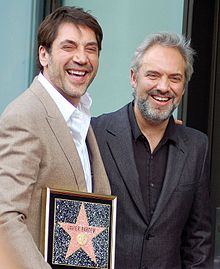Sam Mendes
Sir Samuel Alexander Mendes CBE (born 1 August 1965[1]) is a British film and stage director, producer, and screenwriter.
[4] Born in Berkshire to a Trinidadian Catholic father and an English Jewish mother, Mendes grew up in North London.
He read English at Peterhouse at Cambridge University, and began directing plays there before joining Donmar Warehouse, which became a centre of 1990s London theatre culture.
[11] He attended Primrose Hill Primary School and was in the same class as future Foreign Secretary David Miliband and author Zoë Heller.
[10][15][16] Having developed a passion for theatre only in his late teens, Mendes became a member of the Marlowe Society at Cambridge and directed several plays.
His first play was David Halliwell's Little Malcolm and His Struggle Against the Eunuchs, and one of his later productions was Cyrano de Bergerac with Tom Hollander and Jonathan Cake among the cast members.
In September 1987, Mendes made his professional directing debut with a double bill of two Anton Chekhov plays, The Bear and The Proposal.
[23] Later that year, Mendes made his West End debut at the Aldwych with a production of Chekhov's The Cherry Orchard, starring Judi Dench.
[25] In 1990, Mendes was appointed artistic director of the Donmar Warehouse, a Covent Garden studio space previously used by the Royal Shakespeare Company.
[5] In 1993, Mendes staged an acclaimed revival of John Kander and Fred Ebb's Cabaret starring Jane Horrocks as Sally Bowles and Alan Cumming as Emcee.
This production opened at the Donmar and received four Olivier Award nominations including Best Musical Revival, before transferring promptly to Broadway where it played for several years at the Kit Kat Club (i.e. the Stephen Sondheim Theater).
The Broadway cast included Cumming once again as Emcee, with Natasha Richardson as Sally, Mary Louise Wilson as Fraulein Schneider, John Benjamin Hickey as Cliff, and Ron Rifkin as Herr Schultz.
Bart added new musical material and Mendes updated the book slightly, while the orchestrations were radically rewritten to suit the show's cinematic feel.
The cast included Jonathan Pryce (after much persuasion) as Fagin, Sally Dexter as Nancy, and Miles Anderson as Bill Sikes.
[27] Mendes also directed productions of David Hare's The Blue Room in 1998, starring Nicole Kidman; Richard Greenberg's Three Days of Rain in 1999, with Colin Firth, David Morrissey and Elizabeth McGovern; as well as his farewell duo in 2002, Chekhov's Uncle Vanya and Twelfth Night, both headed by Simon Russell Beale, Helen McCrory, Emily Watson and Mark Strong.
Originally, he planned to stage this production in London's West End with an eventual Broadway transfer, but when negotiations fell through, he brought it to New York.
Mendes also directed the 2013 Olivier Award-nominated stage adaptation of Roald Dahl's Charlie and the Chocolate Factory which ran in London's West End until January 2017.
[29] In 2014, Mendes directed Simon Russell Beale in King Lear by William Shakespeare at the National Theatre, London.
In 2008, Mendes directed Revolutionary Road, starring his then-wife, Kate Winslet, along with Leonardo DiCaprio and Kathy Bates.
The film follows a couple (John Krasinski, Maya Rudolph) searching North America for the perfect community in which to settle down and start a family.
Mendes said in an interview with film magazine Empire in March 2013 that "it has been a very difficult decision not to accept Michael and Barbara's very generous offer to direct the next Bond movie."
The films will be the first Beatles biopics to have full cooperation from Paul McCartney, Ringo Starr, and the families of John Lennon and George Harrison.
[55] The films will star Paul Mescal (McCartney),[56] Barry Keoghan (Starr),[57] Joseph Quinn (Harrison),[58] and an actor to be named as Lennon.
Mendes has listed Stanley Kubrick, the Coen brothers, Alfred Hitchcock, Martin Scorsese, Wim Wenders, Howard Davies, David Lynch, Peter Brook, Ingmar Bergman, Orson Welles, and Francis Ford Coppola as amongst his cinematic and theatrical influences.
[18] Much of his film directing techniques were informed by his background in theatre, which consisted of meticulous attention to detail, slow pacing, pictorialist composition, close collaborations with actors, use of tranquil atmosphere, periods of wordless visual storytelling, and long takes.
[59] His first two films established a reputation for him of utilising a visual style that was considered formalist and classical, preferring to shoot and stage scenes with theatrical-style mise-en-scene and use of chiaroscuro.
The exploration of such themes are owed to his early childhood experiences, particularly with his parents, with the most direct being his grandfather and his mother serving as inspirations for the characters of Schofield and Hilary Small in 1917 and Empire of Light, respectively.
